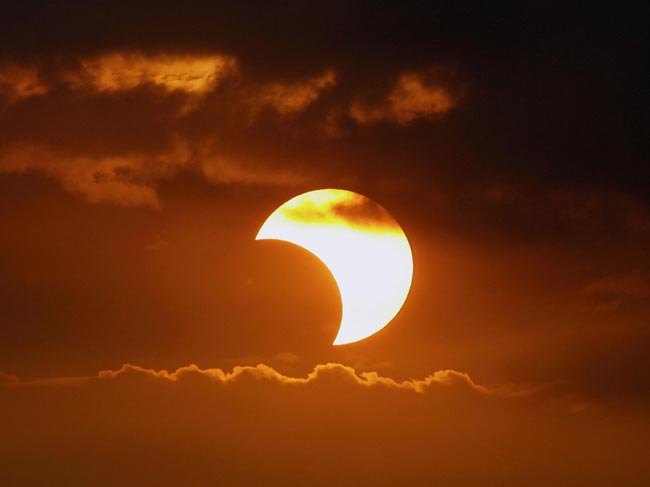Last solar eclipse visible to Sri Lanka until 2022 on June 21
June 15, 2020 11:42 pm
Sri Lanka is currently witnessing an ‘eclipse season’ where three eclipses will occur within the span of 30 days, stated Prof. Chandana Jayaratne, Professor in Physics and Director of Astronomy and Space Science Unit at the University of Colombo.
On June 05, Sri Lanka was able to witness a penumbral lunar eclipse. On June 21, an annular solar eclipse will take place while another penumbral lunar eclipse could be witnessed on July 04 and 05.
The annular solar eclipse on June 21, which is a partial eclipse, will be the last solar eclipse Sri Lanka will be able to view for another 02 years.
The next solar eclipse is due to be sighted on October 22, 2022.
Sri Lankans across the country will have the opportunity to witness the annular solar eclipse on June 21 from 10.30 am to 1.30 pm.
The eclipse will last for nearly 2 hours and 50 minutes with about 30 percent of the solar disk covered by the moon at the time of the maximum eclipse.
Residents in Colombo may sight the beginning of the eclipse at 10.29 am and the maximum eclipse will occur at 11.51 am. The eclipse will end at 1.19 pm.
The timing may change by a few minutes depending on the place of observation, stated Prof. Jayaratne.
From the city of Matara, the partial eclipse can be observed from 10.34 am while the maximum eclipse at 11.53 am and the end of the eclipse at 1.17 pm.
For Jaffna, the partial eclipse may commence at 10.24 am, a maximum eclipse at 11.54 am and the end of the eclipse at 1.30 pm.
Professor Chandana Jayaratne warns that direct eye contact with the sun without proper eye protection can cause blindness or other permanent eye damage.
Special protective spectacles, eclipse glasses, homemade pinhole cameras, welders’ glasses (with gauge 14 or higher dark filters), or solar filters may be used to watch the eclipse. It is advised to use special solar filters if taking pictures of the eclipse with a photographic device.
Normal glasses (even with ultraviolet radiation absorption), sunglasses, telescopes, cameras, binoculars are NOT to be used for the viewing of the eclipse.
It should also be noted that the sun should not be looked at directly for more than 3 minutes continuously, even with the aforementioned filters.












